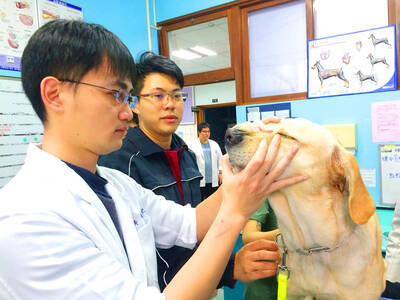More than 80 percent of children in economically disadvantaged families are “parentified” children — meaning they have to share the role of parents in a family — a survey by the Taiwan Fund for Children and Families (TFCF) and the Children’s Welfare League Foundation showed yesterday.
Eleven-year-old Ling (小羚) lives with her grandmother and three siblings in Greater Tainan’s Jiali District (佳里) after her parents divorced and, despite her young age, she takes on the role of a parent in their absence.
“I wake up at about five every morning, and look after my little brothers and sister when my grandma goes out to wholesale market to get vegetables,” she told a press conference in Taipei yesterday. “On weekends or holidays, I go with my grandma to local markets to sell vegetables.”
When Ling returns from school, she does the chores, cooks, bathes her brothers and sister, and helps them with their homework.
Ling’s case is not an isolated one.
“Kids who have to take on the job of being a parent are called ‘parentified children,’ and it’s surprising for us to find in a recent survey that as many as 80 percent of children in economically disadvantaged families have to act like parents at home,” said Weng Hui-yuan (翁慧圓), director of TFCF’s department of social work.
“Most parentified children don’t feel that they are forced to do the job and most do so willingly, but many respondents told us in the survey that they feel tired, psychologically pressured and hopeless,” Weng said.
The two organizations conducted the survey at the end of last month and they collected 1,071 valid samples from third and fourth graders in economically disadvantaged families across the country.
The survey shows that more than 80 percent of the children not only need to help out with household chores, but that they also take care of younger siblings in the family, while 16.7 percent of the respondents even have to earn money for their families.
When asked about their willingness, more than 70 percent of respondents said they believe they are doing what they are supposed to, while 25 percent said they are doing the job because no one else can help out.
The organizations urged the public to lend a helping hand to parentified children.
“Without the appropriate help, these kids may become autistic, have problems getting along with other people and suffer from low self-esteem, since they feel ‘different’ to their peers and they don’t have anything in common with them,” TFCF executive director Miguel Wang (王明仁) said. “As able adults, we should try to help.”

Former Czech Republic-based Taiwanese researcher Cheng Yu-chin (鄭宇欽) has been sentenced to seven years in prison on espionage-related charges, China’s Ministry of State Security announced yesterday. China said Cheng was a spy for Taiwan who “masqueraded as a professor” and that he was previously an assistant to former Cabinet secretary-general Cho Jung-tai (卓榮泰). President-elect William Lai (賴清德) on Wednesday last week announced Cho would be his premier when Lai is inaugurated next month. Today is China’s “National Security Education Day.” The Chinese ministry yesterday released a video online showing arrests over the past 10 years of people alleged to be

THE HAWAII FACTOR: While a 1965 opinion said an attack on Hawaii would not trigger Article 5, the text of the treaty suggests the state is covered, the report says NATO could be drawn into a conflict in the Taiwan Strait if Chinese forces attacked the US mainland or Hawaii, a NATO Defense College report published on Monday says. The report, written by James Lee, an assistant research fellow at Academia Sinica’s Institute of European and American Studies, states that under certain conditions a Taiwan contingency could trigger Article 5 of NATO, under which an attack against any member of the alliance is considered an attack against all members, necessitating a response. Article 6 of the North Atlantic Treaty specifies that an armed attack in the territory of any member in Europe,

LIKE FAMILY: People now treat dogs and cats as family members. They receive the same medical treatments and tests as humans do, a veterinary association official said The number of pet dogs and cats in Taiwan has officially outnumbered the number of human newborns last year, data from the Ministry of Agriculture’s pet registration information system showed. As of last year, Taiwan had 94,544 registered pet dogs and 137,652 pet cats, the data showed. By contrast, 135,571 babies were born last year. Demand for medical care for pet animals has also risen. As of Feb. 29, there were 5,773 veterinarians in Taiwan, 3,993 of whom were for pet animals, statistics from the Animal and Plant Health Inspection Agency showed. In 2022, the nation had 3,077 pediatricians. As of last

XINJIANG: Officials are conducting a report into amending an existing law or to enact a special law to prohibit goods using forced labor Taiwan is mulling an amendment prohibiting the importation of goods using forced labor, similar to the Uyghur Forced Labor Prevention Act (UFLPA) passed by the US Congress in 2021 that imposed limits on goods produced using forced labor in China’s Xinjiang region. A government official who wished to remain anonymous said yesterday that as the US customs law explicitly prohibits the importation of goods made using forced labor, in 2021 it passed the specialized UFLPA to limit the importation of cotton and other goods from China’s Xinjiang Uyghur region. Taiwan does not have the legal basis to prohibit the importation of goods